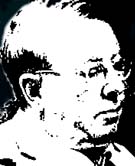

BIOGRAPHICAL
OVERVIEW
ESSAYS
LINK
Yvor Winters (1900-1968) spent some of his childhood years in California. He moved to Chicago where he discovered modern poetry through various happy accidents including an encounter with the magazine The Little Review at the age of sixteen. At the University of Chicago he joined the Poetry Club where he met Janet Lewis, who later became his wife. In his second year at the university he was diagnosed as suffering from tuberculosis and spent three years in a sanatorium in New Mexico. Marianne Moore sent him books from the New York Public Library where she worked, and a French priest taught him the language, while deploring the poetry of Rimbaud which was Winters' main motivation to learn. After a period as the schoolteacher in a remote mining camp, he completed his BA and MA in languages at the University of Colorado at Boulder. In 1926 he married Janet Lewis in Santa Fe and the following year they moved to California. He pursued graduate studies at Stanford, where he stayed until he retired in 1966. Winters combined the careers of poet, critic, teacher and scholar. Many of his early poems, in free verse, were written in the sanatorium in Santa Fe. In 1928 he returned to traditional metres, although he insisted that he did not shift from formlessness to form, rather from a certain kind of form to others.
Rafe Champion
This brief essay shows how Winters identified a kind of 'dry rot' of irrationalism in modern poetry and how he brought his considerable powers as a poet, critic and scholar into play to combat this potentially fatal flaw in our literary culture. David Yezzu wrote in The New Criterion (see link below) that Winters has fallen almost out of sight and "This is a great shame, for it is just Winters's brand of seriousness and his emphasis on logic and reason in poetry that contemporary verse sorely wants". Winters was a profound student of the art of versification and James McAuley drew upon his work in his own book on metrical forms.
Winters spells out what he calls the moralistic theory of criticism, in oppositon to the romantic and other theories which he considers do not to justice to the power and the art of great literature.
True to his word. A profile of the life of Yvor Winters.
the Revivalist
